During the annexation of Ashani (Ghana) Governor Maxwell imposed the King to remove his crown and his sandals, and to come forward with the Queen Mother to perform the act of humiliation in accordance with native custom © Nrf
“Imperialism is a negation of God,” wrote Mahatma Gandhi, “It does ungodly acts in the name of God.” Colonialism was always an awful idea, born of wealthy westerners wanting to become even wealthier by stealing the natural resources of other countries (countries they saw as ‘primitive’, ‘inferior’ and ‘under-developed’, and therefore not worth worrying about) along with their governance and sometimes even co-opting reluctant native inhabitants into assisting in these acts of blatant theft. Growing up in northern England, I saw in my youth many proud parades by military units, some of them boasting of how their predecessors from an earlier age, with Martini-Henry breech-loading single shot rifles in the massive .577-450 calibre, fought off a far larger force of Zulu warriors, carrying assegais and wood-framed leather shields. Of course, the Zulu forces were armed with assegai spears and the shorter iklawa, a sort of scaled down assegai with a double-sided blade roughly 60 centimetres long, while the fighters sheltered behind umbumbolozo shields, made of oxhide that had been pounded to stiffen it.
The massive bullets from the Martini-Henry rifles would have gone through them, however stiff they were, like a hot knife through butter, however. The Martini breech-loading action works very well and I have fired .22 calibre target rifles of that design. Quite a few of the British officers also carried Tranter double-action percussion pistols in .44 army calibre, because pistols were not issued by the War Office and only officers could afford to buy their own, although they were allowed to do so. Tranter, a Birmingham gunsmith of considerable skill, also sold a lot of handguns to the Confederate army during the American civil war, since the southerners were denied access to America’s own arms manufacturing companies, situated in the Unionist north.
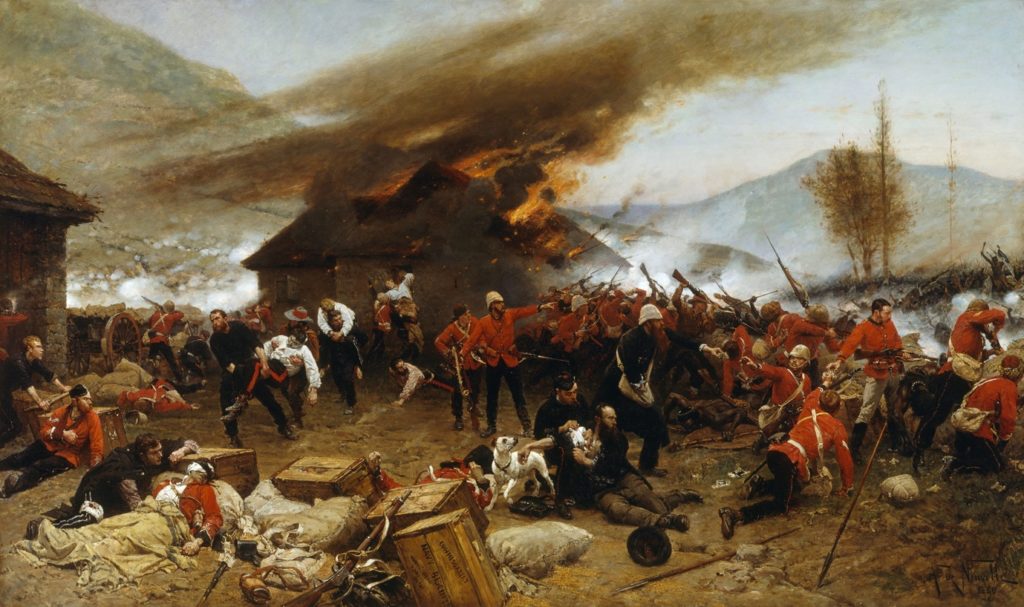
Having clean hands when trading in weapons can’t be easy, although ingenious Southern arms manufacturers did manage to produce a knock-off copy of Colt’s Navy revolver, simplifying it and making some parts in brass to save on costly and hard-to obtain steel. Copies of that rather handsome handgun are (perhaps unsurprisingly) extremely popular among alt-right latter-day Confederacy and Trump supporters. But contrary to popular belief, more Confederate officers used Tranters. In any case, a Tranter .44 round would have pierced an umbumbolozo without much trouble. And, of course, the American Civil War was mainly about slavery and the South’s desire to retain it. A number of Confederate officers undoubtedly had the descendants of captured Africans working on their vast estates. Importing newly-captured slaves became illegal in 1807, so existing slaves were encouraged to breed. More of Gandhi’s “ungodly acts” performed in God’s name, or at least with His assumed approval.

But it’s worth remembering a speech made in Britain’s House of Commons by a 19th century Prime Minister Benjamin Disraeli. “Colonies do not cease to be colonies because they are independent,” he said. This, sadly, would appear to have been a perceptive comment. A surprising number of countries, having thrown off the shackles of colonialism, have opted instead for another form of subservience at the hands of either another country or else of a greedy political leader determined to get to the top of the greasy pole and stay there. People, it would appear, like bullies and willingly welcome those responsible for it, as long as the people being bullied are from a different ethnic group or hold different political beliefs. It’s clear that in several African countries – former colonies – there resides a degree of admiration for the world’s most notorious (and murderous) bullies. In Ethiopia, for instance, government supporters demonstrated in favour of military action against their own home-grown ‘rebels’, the Tigray People’s Liberation Front, or TPLF. To show their feelings more clearly, they erected a poster showing Vladimir Putin and Turkey’s President, Recep Tayyip Erdoğan, smiling together. Throwing off colonialism only to seek out a new colonial master seems a little silly.
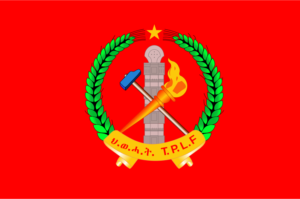
The people of Tigray have powerful enemies: their neighbours, the Amhara, for instance. The current conflict comes after the largely Amharan government of Ethiopia’s Prime Minister, Abiy Ahmed, had a falling out with the dominant political party of Tigray. Now old scores are being “settled” in the time-honoured way of killing everyone suspected of being on the other side. Both sides are guilty. Into this pit of hatred and mistrust, enter Vladimir Putin. He says he just wants to “co-operate” with African governments, eager to find new diplomatic partnerships beyond Europe. In 2021, Russia signed military cooperation agreements with two of Africa’s most populous nations, Nigeria and Ethiopia and the United Nations has accused Russian mercenaries of getting directly involved in conflicts in Libya and the Central African Republic (CAR), although Moscow denies involvement, just as it denies any connection with the so-called “Wagner Group”, the paramilitary organisation accused by the UN of committing human rights abuses in Africa.
THE ABUSED BECOME ABUSERS
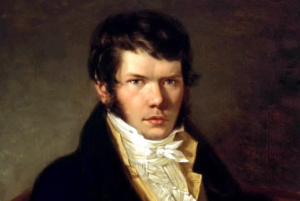
The people of Russia have been used to hardship and pain for a long time and have blamed their religious faith for some of it. “God of frostbite, God of famine,” wrote the Russian poet, Prince Peter Vyazemsky, a century before the Russian Revolution and the victory of Marxism displaced his privileged class from its position of power, “beggars, cripples by the yard, farms with no crops to examine – that’s him, that’s your Russian God.” It’s all very well heaping the blame on “God” when your friends and close relatives indulge in abuses of their own to keep the poor poor. But Vyazemsky was no fan of the privileged either, which can’t have endeared him to people of his own class. Earlier in the same poem, he wrote” “God of medals and of millions, god of yard-sweepers unshod, lords in sleighs with two postillions, that’s him, that’s your Russian god.” With Putin in charge, it seems that he hasn’t gone anywhere either. The Russian people were abused and mistreated down the centuries, and just as children who’ve been abused sometimes grow up to abuse their own children, so it seems that some Russians (by no means all, of course, and probably only a small minority) now seek to inflict discomfort, poverty, and injuries on those of other countries.
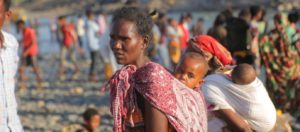
It doesn’t bode well for Africa. Let’s return to Tigray for a moment, where a report from Human Rights Watch and Amnesty International catalogues a wide range of abuses, allegedly perpetrated by security forces and by civilian authorities, all from the neighbouring Amhara area, plus, it’s claimed, with help from the Ethiopian federal authorities. The report describes it all as crimes against humanity and war crimes. The report, which took months to prepare, claims that hundreds of thousands of Tigrayans were forced to leave their homes during what was a violent campaign of unlawful killings, rapes, mass detentions without charges or trial and the denial of humanitarian assistance. The report also mentions widespread atrocities, mainly carried out by Ethiopian troops, together with forces from neighbouring Eritrea. Ethiopian federal forces, obviously, deny the allegations most strenuously It’s not all one-sided, either: fighters belonging to the Tigray People’s Liberation Front have been accused of committing atrocities even across the border in regions controlled by different regimes. In fact, the report continues, fighters loyal to the TPLF have carried out genocidal activities of their own and have gang-raped dozens of women and stolen a lot of property in the Amhara region.
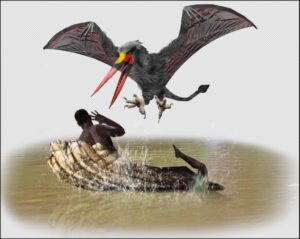
It’s clear that the various countries of Africa have a superfluity of deadly monsters, not only in mythical bestiaries but out in the streets and villages of this vast continent. Why do they need more? If you’ve already got the Kongamato, said to be a huge flying reptile (not unlike a pterosaur, in fact) that supposedly lives in rivers and swamps around Zambia, Angola and Congo and is extremely dangerous, why would anyone invite Putin into the mix with his “Flanker” (in NATO terms) Sukhoi Su-27 fighters, or the MiG-29 (NATO name Fulcrum)? They’re very effective war planes, despite Ukraine’s successes in bringing down the occasional one with Western-supplied missiles.

The fighters sound not unlike the Kongamato, or even the Impundulu of African legend, a bird as big as a human, resident in the areas for which it is legendary, and familiar to Pondo, Zulu, and Xhosa folklore. It reportedly attacks people and, vampire-like, drinks their blood, although its eggs and some of its parts are supposed to have healing properties. Even the most boastful egg-stealing enthusiast I met in my far-off youth would have hesitated before going after the eggs of the Impundulu, although the resemblance of one of Putin’s warplanes to a Kongamato is perhaps closer. Long-abused peoples, having shed their obeisance to a well-armed colonial power, seem to have an inclination to put themselves at the mercy of another, equally violent, rapacious and unpleasant. I know that many will say there’s no comparison between the vicious, greedy imperialist Russia and the former masters, be they French, Belgian, or British. To the poor, downtrodden inhabitants the difference is probably more semantic than altruistic.

In terms of mythical monsters and their resemblance to extant leaders, then my favourite for Putin is the Popobawa of Zanzibar and Tanzania, a demon who is said to look human in daylight but who turns into a one-eyed, bat-winged monstrosity at night, when it attacks and sodomizes males and females alike. He (it?) is especially vicious towards those who don’t believe in him (it?). The comparison with Putin’s attitude towards Ukrainians is inescapable in this instance, I feel. The name Popobawa is Swahili for “bat-wing”. The creature, deeply feared, is a relatively recent addition to the African mythological bestiary but none-the-less terrifying for its apparent youth. I wish I could find my Swahili-English dictionary, left to me by my father who, while serving in Kenya during the 2nd World War, taught Swahili to newly-arrived British squaddies. He loved the place so much that he was keen to accept the offer of a commission in the Kenyan police and to take my mother and my two elder sisters to live there. My mother, never an adventurous woman, refused to go however, and he remained stuck in the UK instead. It’s just as well for me, perhaps; otherwise, I might never have been born.
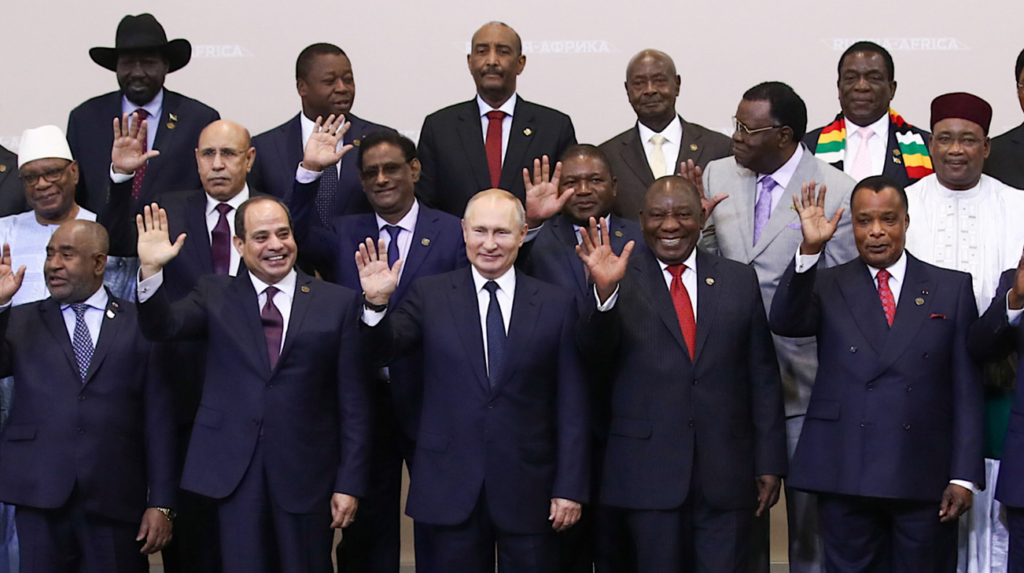
CREEPING RUSSIAN EXPANSION, FORGOTTEN ALLIES
It’s easy to see why the African countries are taking the positions they have chosen regarding Russia’s brutal invasion of Ukraine. They need friends, whilst they themselves have often been accused of human rights abuse. What could be better than a large, well-armed ally that doesn’t give a jot about human rights, abused or otherwise? Russia’s seeming interest in re-engaging with the African continent has already paid dividends. Look at the United Nations General Assembly’s vote in March on a resolution calling for the immediate withdrawal of Russian forces from Ukraine. As you know, the vote in support of the motion was overwhelming: of the 193 members, 141 countries supported it, but the picture in Africa was different. Of the 54 African nations represented, 28 took Ukraine’s side by voting in favour, but Eritrea voted against and the remaining 25 either abstained or simply stayed away. Cameroon, Ethiopia, Guinea, Guinea-Bissau, Burkina Faso, Togo, Eswatini and Morocco didn’t turn up, while Algeria, Angola, Burundi, the Central African Republic (CAR), Senegal, Equatorial Guinea, Congo Brazzaville, Namibia, Sudan, South Sudan, Uganda, Madagascar, Mozambique, South Africa and Zimbabwe abstained.
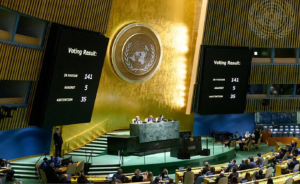
It’s an odd response, however much those countries still resent the former colonialists. It’s like being asked: “Are you opposed to one huge, nuclear-powered country, invading without provocation, a smaller, less powerful nation?” and giving the answer: “We’re not sure.” There’s another point to bear in mind, too. When I first arrived in Togo – the first African country I ever visited and still one of my favourites, with beautiful scenery and stunningly statuesque and elegant people – I was struck immediately by the energy-sapping extreme humidity. It was like walking under bath-warm water while beathing in steam from an overheated shower. For anyone used to Moscow’s chill, it will come as a huge shock. Moscow is interesting, even magnificent in places, but Togo is simply gorgeous. Chaotic, of course, especially at Lomé airport – but simply wonderful. South Africa in particular, after years of ghastly segregation and oppression, has come in for especially powerful criticism, with Herman Mashaba, leader of the new opposition party, Action SA, saying that it placed South Africa on the wrong side of history. The response from President Cyril Ramaphosa in defence of his government’s position was that the resolution paid too little attention to the importance of peaceful dialogue, although Russia sticks to its “we want it all; give it to us or else” approach, which doesn’t seem to be helping.
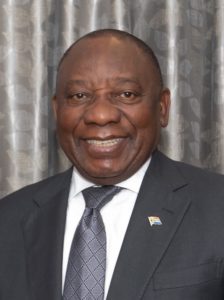
DW news reports a quote from the Angolan political scientist Olivio N’kilumbu, who point out that many in the ANC remain loyal to Russia, at least in its old Soviet Union incarnation. If further proof should be needed, it’s worth noting that large numbers of Africans still support Putin’s claim to be “de-Nazifying” Ukraine. That Russian claim has been bitterly contested in Germany, according to DW. “Sorry, but we can’t keep silent on this one, it’s just far too cynical,” tweeted Germany’s embassy in South Africa. “What Russia is doing in Ukraine is slaughtering innocent children, women and men, for its own gain. It’s definitely not ‘fighting Nazism’. Shame on anyone who’s falling for it,” the German reaction runs, ending with a final “PS” in brackets: “Sadly, we’re kinda experts on Nazism.”
Certainly, the signs are that in some African nations, leaders prefer Russia to the west, perhaps because Russia is perceived as an enemy of the old colonialists. It also asks fewer questions. There have been demonstrations in some African capitals in which locals brandished banners accusing Ukraine of atrocities in places like Donetsk and Luhansk, which have been fighting their own wars for independence from Kyiv for a decade or more, bringing down an airliner in support of their “cause” (what cause can ever justify mass murder on such a scale?) Of course, the Russian news service Pravda still says the Malaysian airlines flight, a Boeing 777, with its 295 passengers, was brought down by Ukrainian forces, a claim that is hard to square with the celebrations by the separatists at their success in shooting it out of the sky. But, as always, the old adage, whose originator remains unknown, that “Truth is the first casualty of war,” remains as accurate as ever. There have been online posts by people who doubt that anyone in Tigray was ever told that “we will erase you from this land”, as Amnesty International claims people there were told. Doubts aside, however, ethnic cleansing against Tigrayans has continued.
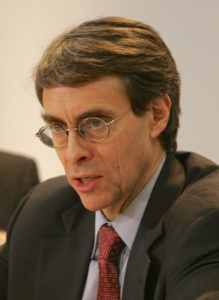
“Since November 2020, Amhara officials and security forces have engaged in a relentless campaign of ethnic cleansing to force Tigrayans in Western Tigray from their homes,” Kenneth Roth, Executive Director of Human Rights Watch said, “Ethiopian authorities have steadfastly denied the shocking breadth of the crimes that have unfolded and have egregiously failed to address them.” Of course, the authorities are not letting anyone in to check, so no action is being taken on the ground. “The response of Ethiopia’s international and regional partners has failed to reflect the gravity of the crimes that continue to unfold in Western Tigray,” according to Agnès Callamard, Secretary General of Amnesty International. “Concerned governments need to help bring an end to the ethnic cleansing campaign, ensure that Tigrayans are able to safely and voluntarily return home, and make a concerted effort to obtain justice for these heinous crimes.” Not much chance of that, I’m afraid, especially if they have Putin on their team.
MORE, MORE, GIVE RUSSIA MORE! (OR ELSE…)
So why is Putin pursuing his charm offensive in Africa? Well, for much the same reason that the colonialist European powers sought to take over African countries in the past: Africa is blessed (or perhaps cursed?) with the sorts of incredible riches of which most continents can only dream. Ghana has oil, Gabon has manganese, there’s coal in Mozambique. The African Development Bank Group says that there are some 120-billion barrels of oil deposits, around half as much as Saudi Arabia, plus 600-million hectares of uncultivated arable land, which represents around half of the world’s total. The banks have estimated that Africa’s natural resources should contribute more than $30-billion (€27.5-billion) per annum over the next two decades.
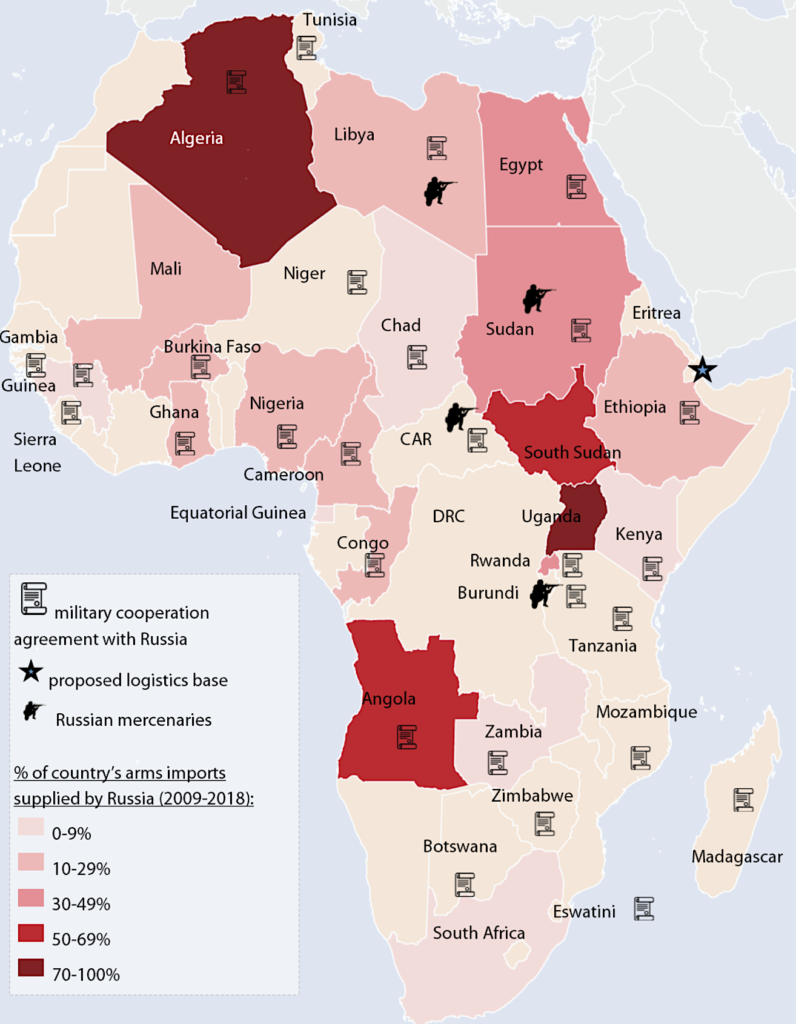
But there are things going in the opposite direction, too: weapons. In 2020, Russia became the biggest supplier of arms to Africa. The previous year, Putin had hosted a Russia-Africa summit, attended by 43 African leaders. Research by the Stockholm International Peace Research Institute (SIPRI) calculates that between 2016 and 2020, around 30% of all weapons supplied to sub-Saharan Africa came from Russia. “I want your natural resources; here, have a few Kalashnikovs in payment so you can kill your neighbours.” By comparison, China supplied just 20%, France 9.5% and the USA a measly 5.4%. Russian influence has grown especially in the Central African Republic, and it has grown especially since 2017, when Russia delivered Kalashnikovs and surface-to-air missiles. The following year, Russia sent experts to train local troops, in exchange for which a large number of Russian companies were granted licences to mine for gold and diamonds, while the country’s president, Faustin-Archange Touadera has Russian guards to keep him safe. At a pro-Russian rally in Bangui, placards could be seen bearing such slogans as “Russia, CAR is with you” and “Russia: save Donbas”, although it’s doubtful if many CAR citizens could even point out Donbas on a map, let alone claim to have visited it.
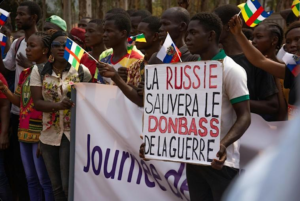
The Guinean writer and intellectual Tierno Monenembo has written that it will not end well and that the African countries that have fallen for Putin’s seduction will never get free from his grip, especially since they rely on Russia’s military skills. That’s why they failed to support the UN resolution. “In such a situation,” Monenembo pointed out, “it is difficult for African nations to take a stand. When you are small, when you are weak, if you’re poorly armed and underdeveloped, you don’t just get involved in a conflict between military superpowers. That’s the business of the big players.” Monenembo added a reference to an old Fulani proverb that he felt to be especially relevant (the Fula people are probably the world’s largest nomadic group of people, based mainly in West Africa): “The chicken doesn’t need to discuss the price of the knife. Whoever is in possession of the knife, that is who will cut the chicken’s throat.” Mr. Putin may have been lining up for himself a large number of potential chickens.
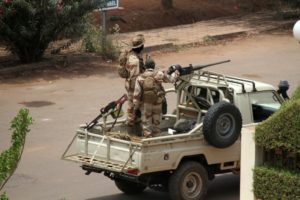
The West African country of Mali certainly offers him rather more than chickenfeed. As Human Rights Watch (HRW) reports: “Human Rights Watch investigations revealed that over the course of several days in late March, Malian army forces and foreign soldiers – identified by several sources as Russians, although it remains unproven – executed in small groups several hundred people who had been rounded up in Moura.”
That’s not how the Malian government reported the incident, of course. A Malian Defence Ministry statement issued on 1 April (ironically known as “All Fools’ Day” in parts of the West) claimed that from 23 to 31 March, the Malian army had killed 203 “terrorists” and arrested a further 51, acting on intelligence that suggested that armed Islamic terrorists were planning to meet up with other rebel “battalions” to plan hostile acts. While the execution of prisoners based purely on their beliefs is not excusable, its cause is, perhaps, vaguely understandable in this case.
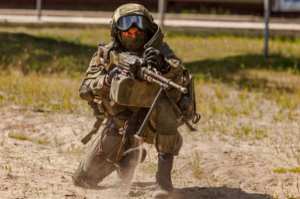
As HRW explains: “The killings occurred amid a dramatic spike in unlawful killings of civilians and suspects since late 2021 by armed Islamist groups linked to Al-Qaeda in the Islamic Maghreb (AQIM) and the Islamic State in the Greater Sahara (ISGS), and by Malian government security forces.” Religion yet again rears its troublesome head. All of the survivors and witnesses said that members of the Malian army and “white soldiers” (reported to be Russian but without proof) killed the men. HRW writes of a lengthy fire-fight at a local meat market between Islamist militias and Malian troops, aided by “foreigners”. “Multiple security sources who spoke to Human Rights Watch said the operation involved over 100 Russian troops and numerous other Malian soldiers. Witnesses said the foreign soldiers appeared to be more numerous during the first two days of the operation,” HRW reports. It’s claimed that over a period of four days, the soldiers detained any men they found in groups of up to ten at a time, then ordered them to walk away to areas where they were executed. Or murdered, if that seems a more appropriate word. In some cases, the victims were shot in the head while others were herded into groups and sprayed with automatic fire. One resident told HRW that: “the sound of gunfire rang out in our village from Monday to Thursday.” Exact figures are hard to come by, but it’s widely believed that the operation killed some 300 local people. It was claimed by one witness that a Russian soldier, speaking through an interpreter, told them that they were all Islamist terrorists, even if they had only gone to the market to buy meat.
MONSTERS OF THE PAST AND PRESENT
The proper name for this landlocked country is the Republic of Mali and it is Africa’s 8th largest country, covering more than 1,200,0002 kilometres and with a population of some 19.1 million, most of whom are under the age of 25. Certainly, Africa has had its share of brutal tyrants, not all of them European colonists.
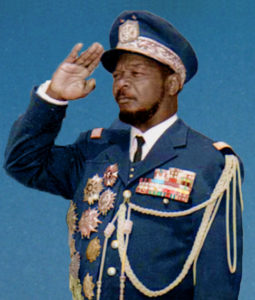
Take the self-styled “Emperor Bokassa” of the Central African Republic. In his admiration for Napoléon Bonaparte, he almost bankrupted his country with his ludicrously expensive “coronation” whilst allegedly serving the cooked flesh of his enemies to guests at dinner. He renamed his country “the Central African Empire” and had lots of children by a wide variety of “wives” (some of them his). It’s claimed that if he fancied a married woman, her husband was locked into an area with a crocodile pool. The crocs were kept hungry while their cannibalistic owner watched the proceedings with glee. Bokassa was also accused of murdering a group of schoolchildren who had thrown rocks at his Rolls Royce as it passed them, protesting at the high cost of new school uniforms they were being forced to wear. Even so, Bokassa was granted political asylum in France for a few years in recognition of his services to the French military, before returning to live what was left of his life in the CAR. The charge against him of cannibalism was never proven, at least not in the eyes of the court, despite his chef testifying that he had often served meat from the “special cold store”, which held the bodies of Bokassa’s departed enemies. He even said he’d served it to former French President Valerie Giscard d’Estaing. I met Giscard on several occasions, and he never struck me as a cannibal, at least, not a willing one. He always assumed I was American for some reason, but he was unfailingly cooperative at giving interesting interviews.

Putin has done more than any other world figure to ingratiate himself with African Leaders, often playing on the old Soviet days, when Russia’s Communist leadership was philosophically (and justifiably) opposed to colonial links and all that they stood for. There is a happy, smiling photo on-line of him with the Ugandan leader, Yoweri Museveni, whom I once interviewed in his palace garden in Kampala. He was very pleasant, open and forthcoming. He even stopped me in a corridor of the European Parliament in Strasbourg for a brief but friendly chat a few weeks later while he was visiting the place; a poster-boy for EU-African relations. I liked him then; I’m not sure I still would today, given his tenacious, even ruthless, determination to cling to power.
Russia seems determined to make itself indispensable to African governments by supplying them with the latest weaponry. According to some reports, weaponry that’s a lot more up-to-date than the weapons being provided for their allies in the breakaway enclaves of Ukraine, even when they’ve been sent to fight Russia’s war in Ukraine. According to a report by Reuters, military conscripts from the Russian-backed Donbas region were sent to fight on frontlines with no training, very little food and water, and most astonishingly, they were armed with Mosin-Nagent rifles from the 1890s. It’s worth bearing in mind that Nagent disputes its involvement, and as a result they’re often just called Mosins, but the weapons themselves are traditionally well-made five-shot bolt-action rifles chambered in 7.62 calibre. However, it seems more likely that Russia would provide its own home-made version, the carbine, still being manufactured during the Second World War, although the (unverified) photographs appear to show the earlier model being carried, as well as a few 1943 versions. The pictures allegedly originate from both Donetsk and Luhansk, as local militia men train for Russia’s Ukraine war. It would appear that Russia doesn’t want to spend much on its volunteer fighters nor to risk modern arms falling into the hands of its potential enemies.
SAINT VLADIMIR, ANYONE?
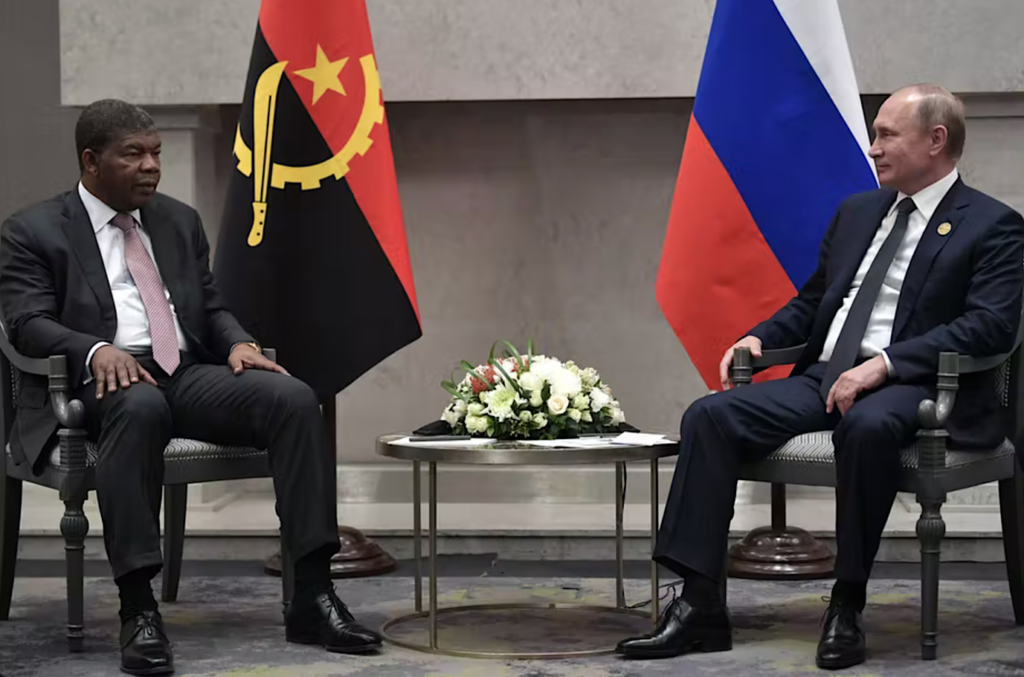
If Putin really wants to ingratiate himself with ordinary Africans, he might like to consider a different route. In the wealthy world, the problem is population shrinkage; in Africa and other poor countries, it’s the reverse. Take Nigeria, for instance, which is expected to overtake the United States by 2050 to become the third most densely-populated country in the world. According to United Nations estimates, its population is likely to double to more than 400-million. As John Bongaarts of the Population Council of New York City points out, that means the duplication of every man-made object in the country: “every school, every clinic, every bridge,” he told Scientific American magazine. And the population continues to produce children to provide tomorrow’s security: the next generation will be needed to till the fields, plant the seeds and harvest the crops, after all. In sub-Saharan Africa, the average woman produces around 4.7 children, while in Nigeria it’s 5.4. Don’t forget that in sub-Saharan Africa, around a quarter of the population – more than 260-million people – do not have adequate food, while 30% of African children there show signs of stunted growth, according to the UN Food and Agriculture Organisation. François Pelletier of the UN Population Division told Scientific American that: “The concentration of population growth in the poorest countries could make it harder for some countries to eradicate poverty, combat hunger and malnutrition, expand service in the area of education and health systems, and improve the provision of basic services and infrastructure.” The broader the gap between rich and poor, the greater the risk of diseases and waterborne infections spreading. Poverty and overcrowding lead to lower life expectancy, more teen births and higher infant mortality.
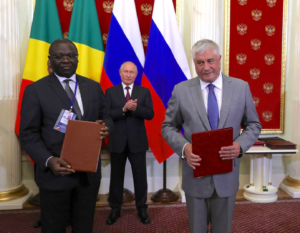
Can Putin come forward with the things poor Africa, impoverished by Europe’s gluttonous and rapacious colonialists, needs to catch up, to avoid the spread of disease, pandemics and to establish vaccination programmes? It would seem that Putin isn’t interested. He’d rather send weapons and Russian mercenaries to help raise the death rate even higher. He is aware, of course, that Africa is also home to some of the world’s fastest-growing economies, but widespread inequalities make it harder to capitalise on this advantage. To help them to realise their aims, a number of African nations have turned to Russia for help, even if it mostly comes out of the barrel of a gun. Russia has a number of private military contractors, who mainly thrive on instability. The more volatile a region is, the less responsible or peace-loving its leader, the more the wealth flows back to Moscow. The notorious Wagner Group of mercenaries (with which Putin has denied a connection) helped to get rid of Libya’s Western-backed UN Government of National Accord, fighting those opposed to President Omar al-Bashir.
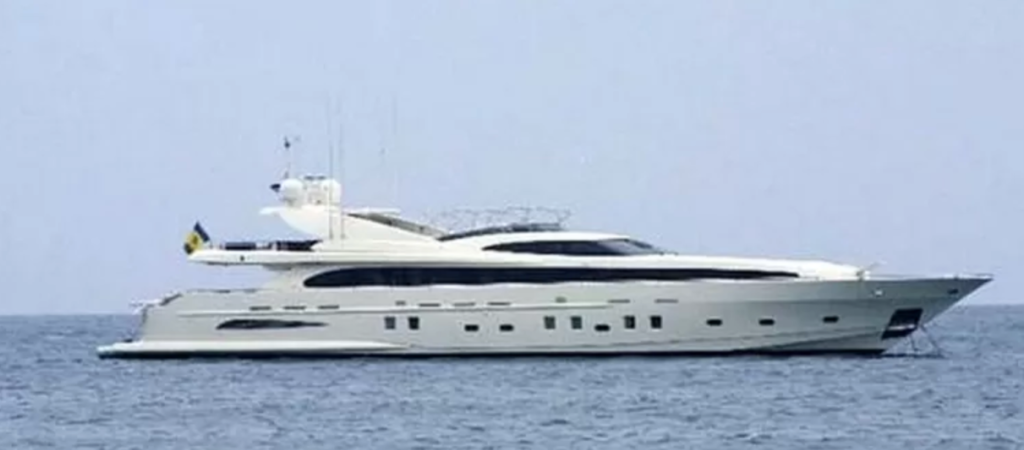
In return, generous gold mining licences were issued to a company linked to another Russian oligarch, Yevgeny Prigozhin. Russia has denied the involvement of the Wagner group in Africa’s armed conflicts, but when French forces withdrew from Mali in February 2022, crowds appeared in the streets of Bamako bearing the slogan, “Merci Wagner”. Russia has also sponsored pro-Russian television channels as well as interfering in elections to ensure Russia’s friends are in charge and Putin remains popular.
Believers in African folklore may consider Putin to be a tokoloshe, an evil demon figure or water-sprite that can be called upon by wicked people to cause trouble for their enemies, including illness and death. Tikoloshe – or Tokoloshe – is a Xhosa word, used by Zulu people, and the legendary creature can also ravish women and bite off the toes of sleepers. When he is around, make sure women have the weapons handy with which to defend themselves and also keep their shoes on. The only way to get rid of a Tikoloshe is by resort to a Shaman. The trouble is that Putin is responsible for rather more than mere “night terrors”; his terrors can last for much, much longer.

